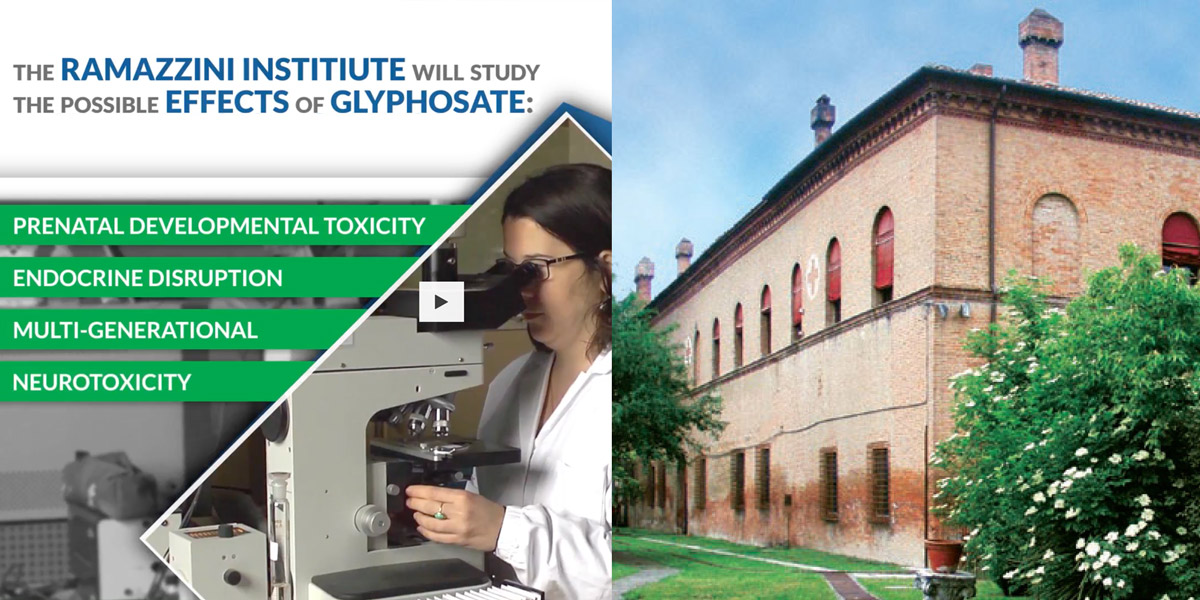
Preliminary study showed glyphosate and Roundup altered biological parameters connected with sexual development and genotoxicity as well as affecting the gut microbiome
The Ramazzini Institute in Italy is launching a crowdfunding appeal to fund a €5 million five-year study on glyphosate and Roundup. The long-term study will follow up on the results of a shorter 90-day study, which the Ramazzini says showed that glyphosate and Roundup caused potentially harmful effects in rats at a very low realistic dose. This dose was equivalent to that which US regulators claim is safe for people to ingest every day of their lives.
The results of the first study, which will be published in a journal later in the year, will be presented at a conference this week. The Ramazzini has already sent them to the Italian Health Ministry, which has said it will vote against the Commission proposal of a ten-year renewal of glyphosate's authorisation in Europe.
The first study showed that glyphosate and Roundup altered key biological parameters connected with sexual development and genotoxicity as well as affecting the gut microbiome.
The results are unlikely to be welcomed by the Reuters reporter and glyphosate defender Kate Kelland, who seized upon an early announcement by the Ramazzini that nothing had yet been found in the glyphosate herbicide-exposed animals. However, the announcement came before the examinations of key parameters that showed changes.
Dr Fiorella Belpoggi, director of the Cesare Maltoni Cancer Research Centre at the Ramazzini, told the magazine EU Food Policy[1] that she had asked the Italian Health Minister to intervene and ask for a renewal for no more than five years at the meeting of the Standing Committee (Plants, Animals, Food and Feed) this week.
She added that in the initial study there was more evidence of potential harm from Roundup than for glyphosate in isolation. Roundup is the substance that we are all exposed to, but glyphosate in isolation is the substance that both the European Food Safety Authority and the European Chemicals Agency evaluated.
Data from the new long-term Ramazzini study will cover:
* The toxicity of glyphosate and Roundup at real-life exposures
* The carcinogenicity of glyphosate and Roundup at real-life exposures
* The multi-generational effects of glyphosate and Roundup at real-life exposures
* The neurotoxicological effects of glyphosate and Roundup at real-life exposures
* The endocrine disrupting effects of glyphosate and Roundup at real-life exposures
* The prenatal developmental toxicity effects of glyphosate and Roundup at real-life exposures
* The effects of glyphosate and Roundup at real-life exposures on the microbiome.
The Ramazzini Institute's members had paid for the first €300,000 study, Dr Belpoggi said. She told EU Food Policy, "Now we need global support for the full comprehensive study. This is a not-for-profit study and aims finally to give a clear answer to the public and government regulators on the possible effects/safety of glyphosate. We want to enable independent science to once again change the world with the help of the global public, as industry-funded science will never be trusted."
To carry out the experiment, the Ramazzini is partnering with other institutions, including the University of Bologna, the Mount Sinai School of Medicine in New York, the George Washington University, and the Cancer Institute of Genoa.
Over the past 40 years, the Ramazzini has produced studies that have led to regulatory restrictions on chemicals such as benzene and vinyl chloride.
Unlike most experimental institutes, the Ramazzini does not cull the animals at a certain age but allows them to reach the end of their lifespan.
Notes
1. EU Food Policy (2017). Ramazzini launches crowdfunding appeal for independent five-year study. 23 Oct; subscription only.










